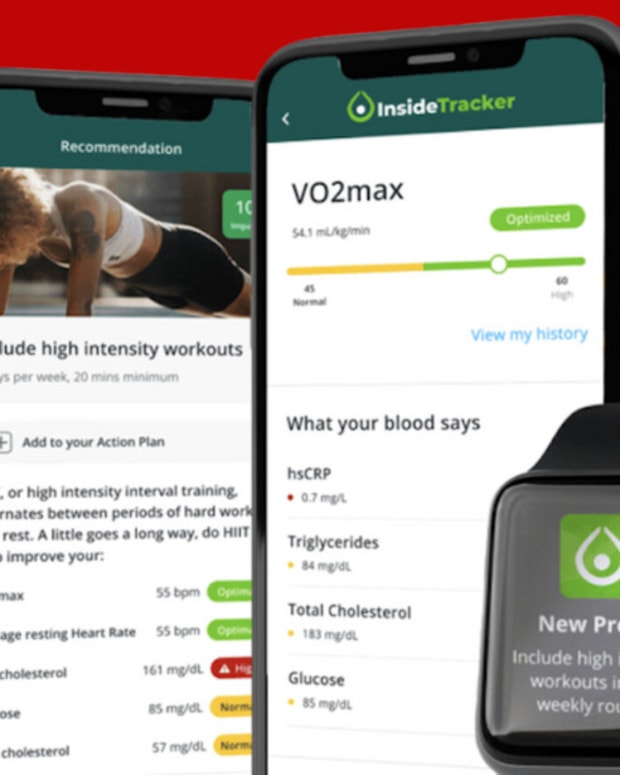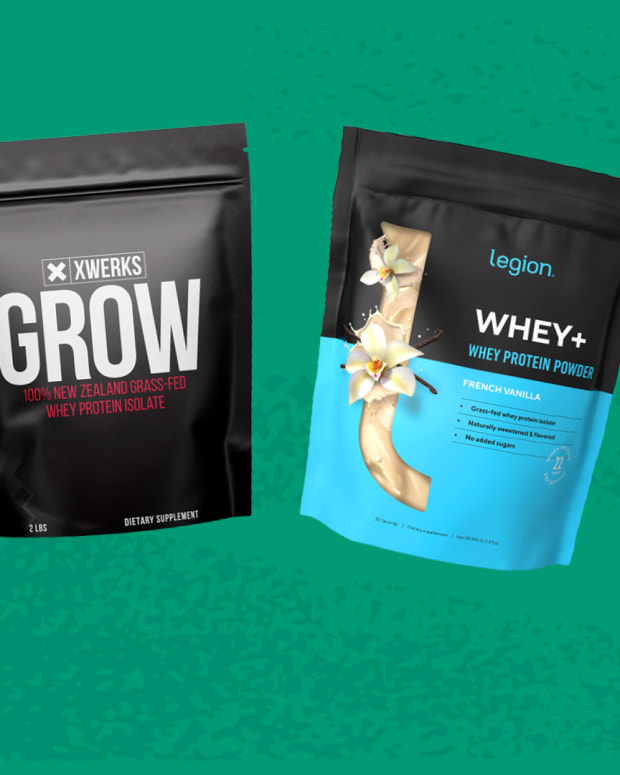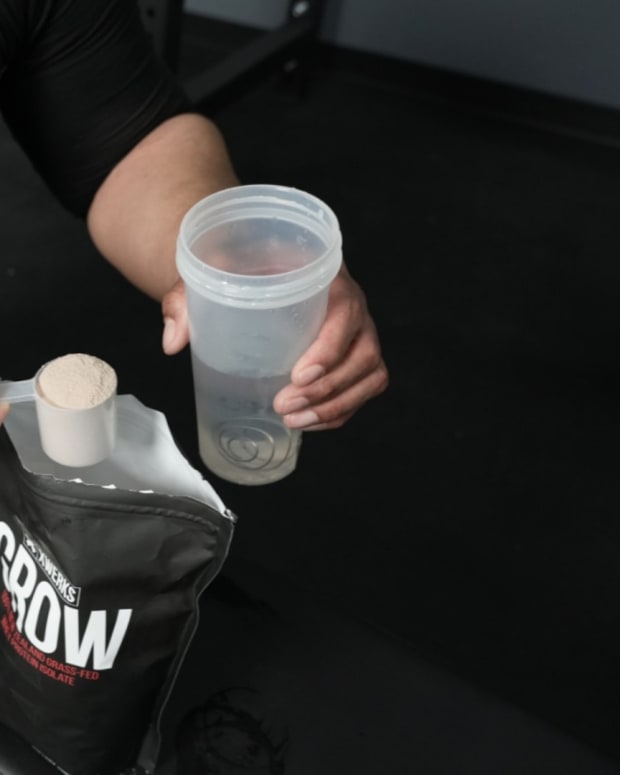The products featured in this article have been independently reviewed. When you buy something through the retail links on this page, we may earn commission at no cost to you, the reader. Sports Illustrated editorial staff are not involved in the creation of this content. Learn more here.
There’s just something about eating a bowl of fruity cereal that takes you back to watching cartoons on a Saturday morning. But even “healthy cereal” that you find in the grocery store is typically loaded with empty carbohydrates and refined sugars that may not fit into your diet plan. Enter: Magic Spoon, a cereal made for health-conscious grown-ups.
Magic Spoon is a low-carb, high-protein cereal that doesn’t contain any sugar or grains. I know what you’re thinking: “But does it actually taste good?” I was skeptical too. Over the course of the last month, I tried several flavors of Magic Spoon cereal to see if it lives up to the hype. Here are the results of my taste test, and everything else you need to know about the cereal and the brand.
This content is meant to be informative, but should not be taken as medical advice. It is not intended for use as diagnosis, prevention or treatment of health problems. Always speak with your doctor before starting any new supplement or exercise regimen.
Magic Spoon Cereal At a Glance
- Gluten-free, grain-free and sugar-free
- Contains 12–14 grams of protein per cup
- Comes in eight flavors, plus limited edition options
- Has 3–5 grams of net carbs per serving
- Sweetened with monk fruit and allulose
What we like:
- Great texture and crunch
- Not too sweet
- Comes in many flavors
- No sugar alcohols or artificial sweeteners
- Fills you up
Things to consider:
- Slight aftertaste with some flavors
- Boxes are small
- Expensive
Magic Spoon Cereal Claims
Magic Spoon’s biggest claims to fame are that it’s high-protein and low-sugar (“keto-friendly”). It’s also grain-free and gluten-free (although the cereals and cereal bars are both made in facilities that process products that have gluten). Most conventional cereals are chock-full of carbohydrates and sugar and don’t offer much beyond that.
Magic Spoon says that you can eat the cereal without worrying about sugar crashes or empty carbohydrates. And because it’s higher in protein, it actually makes a good breakfast option that keeps you full. Magic Spoon also uses allulose as one of its main sweeteners, stating that it has zero glycemic impact (making it safe for diabetics and anyone watching their blood sugar) and almost zero calories.
Magic Spoon Cereal Ingredients
The exact ingredients in Magic Spoon cereal depend on which flavor you get, but all cereals start with the same main base of ingredients: milk protein blend (casein and whey protein concentrate), monk fruit, allulose, high oleic sunflower oil and avocado oil.
Milk protein blend
Magic Spoon cereals have 12–14 grams of protein per cup. The protein comes from a mix of casein and whey protein concentrate.
Research shows that casein protein has the potential to help post-exercise recovery and improve performance, especially when consumed before bed. Whey protein has also been shown to enhance recovery after exercise and help build lean muscle mass.
However, the amount used in most studies is much more than what you’ll get from this cereal. For example, the study on casein used 48 grams, and a scoop of whey protein powder typically contains around 20–25 grams.
If nothing else, the protein in this cereal can help keep you full. Protein is known for being satiating, and typically it’s recommended to consume around 20–25 grams of protein per meal to take advantage of this, and other, benefits. While the Magic Spoon cereal itself doesn’t contain this much, you can add another 8 grams of protein if you eat it with a cup of organic whole milk (which is what I mixed it with).
When testing the cereal, I actually measured out 1–1 1/2 cups and poured in a cup of milk. After eating it, I was noticeably more satisfied than if I ate a bowl of Frosted Flakes or other similar sugar-packed cereal. I also enlisted the help of my fiancé, since we have different appetites and different taste preferences. He agreed that he felt fuller when eating this cereal compared to others.
Monk fruit and allulose
Magic Spoon uses a sweetener blend of monk fruit and allulose, but the company doesn’t say exactly how much of each sweetener it uses. The first iterations of Magic Spoon used stevia as a sweetener, but it was recently removed since many people (including me) get a gnarly aftertaste when eating stevia.
Both sweeteners are low-glycemic and very low-calorie (we’re talking less than half a calorie per gram), and Magic Spoon claims it chose these two because they don’t have an impact on your blood sugar. And research agrees for both monk fruit and allulose.
Monk fruit is also carb-free, but allulose contains 4 grams of carbohydrates per teaspoon. But while this contributes to the total carbohydrate count, they’re not considered “usable” or fully digestible carbohydrates. Because of this, keto dieters subtract them from total carbohydrates to get “net carbs,” or carbs that have an effect on your blood sugar.
During testing, I didn’t have a blood sugar monitor to measure my body’s personal response, but I did notice that I didn’t feel any type of “sugar high” or shakiness after a couple of bowls—something that I usually experience when eating foods with a lot of added sugar.
High oleic sunflower oil and avocado oil
High oleic sunflower and avocado oil both contribute to the fat content of the cereal. Depending on which flavor you choose, you’ll get 9 to 9 grams of fat. This fat not only contributes to the texture and flavor of the cereal, but it can also slow down stomach emptying and help balance hunger hormones to keep you full longer.
Avocado oil is also anti-inflammatory and has an antioxidant profile that’s similar to olive oil. In other words, you’re getting some healthy fats in addition to protein.
Other ingredients
All Magic Spoon cereals also have a handful of “filler” ingredients that help improve consistency and/or flavor, and help increase shelf life. The remaining ingredients in most Magic Spoon cereals are tapioca starch, chicory root fiber, salt and natural flavors, but this may vary a little bit depending on which flavor(s) you get.
Nutrition Facts
| Calories | Protein (grams) | Carbs (grams) | Net Carbs (Grams) | Fat (grams) | Sugar (grams) |
|---|---|---|---|---|---|
140-170 | 12-14 | 10-15 | 4-5 | 7-9 | 0 |
The nutrition facts also vary slightly, depending on which flavor you choose. In general, you can expect around 140–170 calories per cup, which is one serving. With that, you’ll also get 12–14 grams of protein, 10–15 grams of carbohydrates, and 7 to 9 grams of fat. There’s no sugar in any of the cereals, so if you count net carbs, you’ll get 4 to 5 grams per serving.
This cereal is fairly low in calories and carbohydrates—whether you’re looking at total carbohydrates or net carbs—and is a good source of protein, especially when compared with other types of cereal. Because of this, it’s a good fit for both those who are trying to lose weight or build muscle. With 7 to 9 grams of healthy fats, it’s also a good fit for those on the keto diet.
You can alter the macros to suit your needs by varying the types of milk you use with the cereal. If you want to add minimal carbohydrates, you can use almond milk, which only has about 3.5 grams of carbohydrates per cup. If you want more protein, you can opt for dairy milk, which has eight grams of protein per cup.
Magic Spoon Cereal Flavors
Magic Spoon has nine foundational flavors: Fruity, Peanut Butter, Cocoa, Frosted, Birthday Cake, Cinnamon Roll, Honey Nut, Maple Waffle and Blueberry Muffin. The company also releases limited edition flavors. At the time of writing this, they have Cocoa Peanut Butter and Pumpkin Spice. I’ve also tried Jelly Donut and Strawberry Banana in the past.
For this round of testing, I ordered the six-box variety pack and tried Fruity, Peanut Butter, Cocoa, Frosted, Cinnamon Roll and Blueberry Muffin. My fiancé and I both tried the cereal dry out of the box and with milk, and had similar thoughts and opinions.
The Cocoa and the Frosted were our least favorite flavors. The Fruity and the Blueberry Muffin were our favorites. The Fruity tasted just like Froot Loops to me, but a little less sweet—in a good way.
Magic Spoon used to sweeten its flavors with stevia and I’ve tried their cereal in the past and didn’t like it because of the aftertaste. My fiancé, who isn’t sensitive to stevia, never had a problem with an aftertaste. However, the company recently changed to a monk fruit and allulose blend that tastes much better and doesn't leave an aftertaste for the most part.
Here are my thoughts in a nutshell:
- Cocoa: There wasn’t a strong chocolatey flavor and I got an aftertaste with this one—the only one of the bunch. It was one of my least favorite flavors.
- Fruity: It had great texture, great crunch, and a delicious flavor—sweet, but not too sweet. This was both of our favorite flavors.
- Frosted: I was not a fan of this one. My fiancé thought it tasted like licorice. It was better in milk than dry, but still a no for both of us.
- Blueberry Muffin: This was my second favorite. It had a nice blueberry flavor, but wasn’t overly sweet. It does lose a little of its flavor in milk, though.
- Cinnamon Roll: I thought this one was O.K. It had more spicy cinnamon notes to me, but my fiancé thought the sweetness was nicely balanced.
- Peanut Butter: This one had a nice balanced peanut butter flavor that was just enough, but not too sweet. The crunch and texture were great.
Overall, I would rate the cereal a 4/5 stars. It had an excellent texture and held up to the milk really well. It didn’t get soggy quickly and had a nice crunch to it. It was a balanced crunch that didn’t cut up the roof of your mouth as some other cereals can (I’m looking at you Cap’n Crunch), but wasn’t mushy.
Is Magic Spoon Cereal Healthy?
It’s hard to answer a general question like this. Is it healthier than other sugary cereals? Yes. But is it healthy in general? That depends on who you ask.
For me, I consider Magic Spoon cereal a nice treat. If I want a healthy breakfast, I’m not going to choose it over a veggie omelet, but I feel good about eating it when I’m craving a bowl of cereal.
Magic Spoon Cereal Cost and Where to Buy
There’s no getting around it: Magic Spoon is considered a premium breakfast cereal, so you’re going to pay more for it. Each box retails for $9.75, and has about five one-cup servings. This breaks down to $1.95 per serving, which really isn’t that much, especially when you consider that you’re getting a higher amount of protein. In other words, you’re probably going to eat less than you would with other cereals.
You can buy Magic Spoon directly from the retailer’s site, or at Walmart, Target or Amazon. If you purchase directly from the site, you’ll have to buy the cereal in cases of four or six boxes. If you buy from the other retailers, you can buy individual boxes.
I purchased directly from the site and chose a mix-and-match option that allowed me to try six different flavors as one bundle. It also came with a free extra box—another perk that can come with ordering directly from Magic Spoon if you time it right.
What Customers Are Saying About Magic Spoon Cereal
Magic Spoon has tens of thousands of reviews across the brand’s site and on Amazon, earning a 4.7/5 stars on average. Overall, customers are really happy with the taste, texture and nutritional value of the cereal. They also love that there are limited edition options that contribute to the variety—although they’re sad to see some of their favorite seasonal flavors go.
Some say that the cereal leaves them a little dry-mouthed, or that they get a slight aftertaste, but they say that the balanced flavor and the low-carb count outweigh the potential drawbacks.
About Magic Spoon
Magic Spoon started as a direct-to-consumer cereal brand in 2019. It was founded by college friends, Gabi Lewi and Greg Sewitz, two cereal-lovers who wanted to provide a better option for the approximately 25 percent of adults (and 40 percent of kids) who regularly eat cereal. Growing up, cereal was a big part of the friends’ Saturday morning routine, and they wanted people to be able to continue that tradition without regularly consuming all the undesirable ingredients that can be in conventional cereals.
It took them over a year of experimentation to land a formulation that they wanted to bring to market. When Magic Spoon first launched, it was available only on the brand’s site, but it’s now been picked up by mass retailers like Amazon, Target, and Walmart.
Magic Spoon FAQs
What is the sweetener in Magic Spoon?
Magic Spoon uses two sweeteners: monk fruit and allulose. Both of them are low-glycemic and have no net carbs. The company used to use stevia, but decided to remove it.
How many carbs are in Magic Spoon cereal?
It depends on which flavor you get. Total carbohydrates range from 10–15 grams. However, since monk fruit and allulose don’t affect blood sugar, you may want to count net carbs instead; there are 4–5 grams in Magic Spoon cereals.
Does Magic Spoon cereal come with a spoon?
No, Magic Spoon cereal does not typically come with a spoon. In general, the name is just a play on words. However, you may find that some value packs come with a spoon.
Who is behind Magic Spoon cereal?
Magic Spoon was created by two college friends, Greg and Gabi, who wanted to make healthier versions of the nostalgic breakfast cereals they grew up eating. While adults still love cereal, kids are the biggest consumers and they wanted to provide a healthy option for the younger generation too.
How much sugar is in Magic Spoon cereal?
All Magic Spoon cereals have zero sugar. They don't contain cane sugar, corn syrup or sugar alcohols. Instead, they’re sweetened with low-glycemic monk fruit and allulose.
Takeaway: Is Magic Spoon Worth It?
If you’re looking for a keto cereal, a high-protein snack or a healthier option to curb your cereal cravings every once in a while, Magic Spoon is worth it. Because the boxes are small, it’s not going to last as long as other cereals, but it’s a good option if you’re willing to stick to smaller portion sizes so the box doesn’t run out with one or two bowls. And if you’ve tried Magic Spoon in the past, it’s definitely worth trying again now that the sweeteners have changed—the current versions taste much better than previous iterations.
These statements have not been evaluated by the Food and Drug Administration. This product is not intended to diagnose, treat, cure, or prevent any diseases.
Prices are accurate and items in stock as of publish time.











